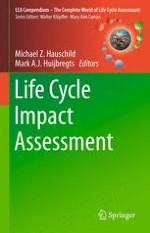2015 | OriginalPaper | Buchkapitel
12. Water Use
verfasst von : Stephan Pfister
Erschienen in: Life Cycle Impact Assessment
Verlag: Springer Netherlands
Aktivieren Sie unsere intelligente Suche, um passende Fachinhalte oder Patente zu finden.
Wählen Sie Textabschnitte aus um mit Künstlicher Intelligenz passenden Patente zu finden. powered by
Markieren Sie Textabschnitte, um KI-gestützt weitere passende Inhalte zu finden. powered by
